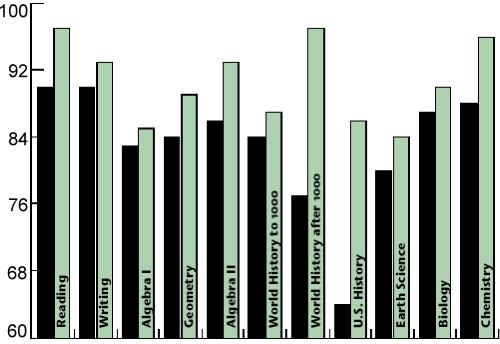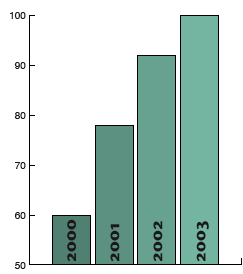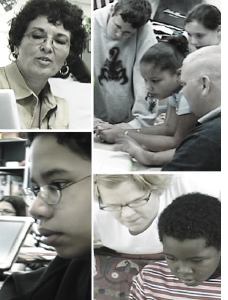
Benefits
��
��After more than 10 years studying laptop computing in schools, Saul Rockman (2003) concludes that one of the most important benefits of a laptop program is an increase in 21st century skills. "Developing the ability to learn independently, collaborate with peers to accomplish work, and communicate the conclusions of your work are the core of 21st century skills, and a highly valued set of competencies in the world outside of school. These accomplishments are seen in many laptop programs, especially those that permit students to take their computer home in the evening." (Rockman, 2003) A workforce with accomplished information and communication skills, thinking and problem-solving skills, and interpersonal and self-directional skills will attract new businesses to Florida and contribute to our state's economic well-being. ��
State Standards
Although laptops primarily provide students with opportunities to develop 21st century skills, their use also impacts state achievement tests. This has been demonstrated dramatically in Virginia. After two years of a laptop initiative in Henrico County, high school score results increased on all eleven of the Virginia Standards of Learning tests. In 2000, only 60% of Henrico's regular schools were accredited according to Virginia Standards of Learning criteria. By 2003, 100% of Henrico's regular schools were accredited. This includes 40 elementary schools, 11 middle schools, and 9 high schools.

Percent of high school students in Henrico County passing the Virginia Standards of Learning by subject for the school years 2000-2001 (shown in black) compared to 2002-2003 (shown in green).��
�� | Percent of regular schools in Henrico County receiving accreditation for the years 2000 through 2003. |
Change in classroom teaching
In a study of over 3,000 teachers in Maine's laptop program, researchers found significant increases in the teachers' use of technology, especially in conducting research, developing materials, managing student information, and communicating with colleagues, students, and parents (Silvernail, 2004).
Bette Manchester, a teacher in Maine's labtop initiative, summarizes the effect of technology on classroom teaching. "One-to-one computer access changes everything. But let me make this crystal clear: This is not about technology or software, it is about teaching kids." ��
Even informal studies of laptop use in schools have identified an increased student enthusiasm as one of the program outcomes. This anecdotal evidence was confirmed in a recently released study of middle school students participating in the Maine laptop initiative (Silvernail, 2004). Over 12,000 students returned surveys in the fall of 2003. Students indicated their level of agreement with a list of statements about laptops and school. The results are extremely positive about laptop use in school:
Many laptop schools also report a substantial drop in student absenteeism. Manatee County experienced a near 40% drop in absentee rates in classes with laptops. Maine schools have reported up to a 50% decrease in student absences. In one Maine high school the rate dropped from 9% to only 2%. Schools have long valued a high attendance rate as one measure of success. A number of laptop schools have also reported a decline in discipline problems among students. ��
Parental satisfaction is also a measure of success. A national Gallup poll reports than 71% of parents are satisfied with their children's education. In Henrico county, that number is a remarkable 94%. Schools note that parent satisfaction, support, and communication is increased in those programs where the laptop is permitted to be taken home. In these cases, the laptop opens a new means of communication and sharing between school and home.
Some laptop programs have even instituted parent training on the laptops in an effort to contribute to the economic well-being of the community.��

Change in student attitudes and work habits
80% "I would rather
use my laptop" 80% "I am more likely to edit
my work with a laptop" 75% "Laptops help me be
better organized" 70% "Laptops improve the
quality of my work" 70% "I am more involved
in school with a laptop" 70% "I do more work
when I use my laptop" 70% "Laptops make school
more interesting"
Parents and Community
 Laptop schools often report a surge in parental and community involvement once laptops have been introduced. Schools have reported a 100% participation in events that are prerequisite to laptop distributions. Rockman (2003) states that laptop schools typically "see higher attendance at PTA meetings; increased communication via e-mail, phone, or face-to-face meetings; parent participation in tutoring programs and parent-student computer classes offered through the school; and more volunteering at the schools."
Laptop schools often report a surge in parental and community involvement once laptops have been introduced. Schools have reported a 100% participation in events that are prerequisite to laptop distributions. Rockman (2003) states that laptop schools typically "see higher attendance at PTA meetings; increased communication via e-mail, phone, or face-to-face meetings; parent participation in tutoring programs and parent-student computer classes offered through the school; and more volunteering at the schools."